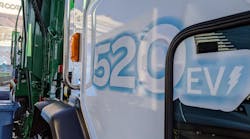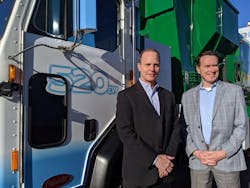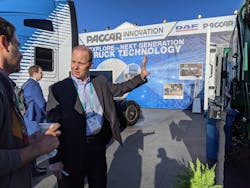For global truck and engine maker Paccar Inc., the annual CES event in Las Vegas is a natural place to showcase its electric and autonomous technologies.
“It’s clear as you walk around the show, the ‘Consumer Electronics Show’ is evolving from a venue for traditional consumer electronics, and is becoming a global stage for the demonstration of future transport solutions and solutions for mobility,” said Stephan Olsen, general manager of the Paccar Innovation Center, based in Silicon Valley.
This was the third straight year Paccar exhibited in an outside area known as Central Plaza. The 2020 event attracted more than 4,400 exhibiting companies and 170,000 attendees.
There were three trucks on display at the Paccar booth: a Kenworth Level 4 autonomous T680, a Kenworth K270E battery electric truck and the Peterbilt battery-electric Model 520EV, a low-cab forward vehicle for the refuse industry that can handle a full day on a single charge.
These trucks were practically impossible to miss for the thousands of attendees streaming down the escalators each day from the popular monorail station at the Las Vegas Convention Center. An even larger number of attendees were drawn to the Central Plaza to visit Google and Impossible Foods, which created major buzz as it premiered its Impossible Pork and Impossible Sausage.
“Our presence [at CES] is raising awareness with the public that may not be aware - or pay attention - to commercial vehicles on the road,” Olsen said. “Being here gives them the opportunity to understand the technology that goes into trucks, and understand how freight gets moved.”
Scott Newhouse, chief engineer of Peterbilt Motors, said many of the advanced safety and emissions technologies shown in past years at CES are beginning to make their way into commercial vehicles.
For fleet customers, it is about technologies that raise efficiency, safety and enhance the overall driver experience. In the case of the Model 520EV, the public will benefit from the quiet, zero-emission waste haulers that will begin making their way through neighborhoods in the near future, Newhouse said.
The 520EV is powered by a Meritor/TransPower energy storage subsystem with a total storage capacity of 308 kWh. It offers up to 430 horsepower and features a range of about 100 miles.
As CES got underway, Peterbilt announced it had completed 40,000 real-world miles with its fleet of 16 battery-electric vehicles. The fleet includes the 520EV, as well as the Model 579EV, used in drayage and regional haul applications.
The same week as CES, truckload carrier Werner Enterprises announced on social media it was launching a pilot program to evaluate a Peterbilt 579EV in year-long stint in southern California.
Newhouse stressed the importance of these vehicles being involved in real-world operations for customers. Several fleets are beginning to run these vehicles in multiple states, a sign to Newhouse they are pleased with the initial performance and looking at how “the technology applies across their businesses.”
Peterbilt said additional vehicles will be put into service during 2020 in drayage, regional haul and medium-duty delivery applications. At CES, Peterbilt announced a collaboration with Dana Corp. on electric powertrain development for the 220EV, which was first shown at CES in 2019.
Peterbilt will integrate Dana’s Spicer Electrified e-propulsion system into the chassis. The truck will also be equipped with two battery packs and an on-board charger. Using the vehicle’s DC fast-charging system, the high-energy density battery packs can recharge in about an hour.
Pricing and option availability for these vehicles are expected to become available in the second quarter. Low volume production is projected to begin late this year for the 220EV and 579EV, followed by the 520EV in 2021.
Even as it pushes forward with battery-electric trucks, Paccar continues to develop hydrogen fuel cell technology, which Newhouse said could wind up being the right energy source in the future for certain applications. Kenworth displayed a hydrogen fuel cell Class 8 tractor each of the past two years at CES. Peterbilt had shown a Model 579 with Level 4 capabilities at CES in 2018.
Besides featuring the three trucks at this year’s show, Paccar’s exhibit space again highlighted its Innovation Center, which celebrated its second anniversary in the fall. Olsen said it was opened to further raise the company’s profile in Silicon Valley and develop relationships with the right technology partners.
Editor’s note: Additional coverage of Kenworth’s trucks is planned for later this week.





